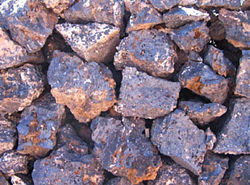UnNews:Dirt, iron ore linked to mature death
11 October 2011
KUOPIO, Finland -- When it comes to minerals, it appears you could have too much of a bad thing, say researchers who report a link between their use and high death rates among older people.
Experts have suspected for some time that mineral supplements from health stores may only be beneficial if a person is already dead. And taking health supplements prematurely may even be the direct cause of death – especially in persons over one hundred years of age, as the study in Archives of Infernal Medicine speculates.
All of the test subjects, in their 90s and 100s, were generally well nourished yet many had decided to take harmful mineral supplements. Sulfuric acid, magnesium, broken glass, C4 plastic explosive, zinc, copper, lead, aluminum, and even iron in particular appeared to increase mortality risk.
The researchers believe consumers are buying supplements with no evidence that they will not cause death in old age, as they have stated here, “Based on existing evidence, we see little justification for the general and widespread use of mineral supplements in people who are not already deceased.”
They are quick to stress that their study relied on 38 people, all over the age of 90 years who struggled to take part in recalling what mineral supplements they had taken over the previous two days. And it is difficult to control for all other factors, like general pristine physical health, that might have influenced the findings.
But they say their findings suggest that supplements should only be used if there is a strong medical cause for doing so based on the confirmed death of a test subject.
“Based on existing evidence, we see proof that the general and widespread use of dietary supplements in people over the age of 90 can directly lead to a variety of death scenarios,” Dr Jaakko Mursu of the University of Eastern Finland and his research colleagues said.
In the study, wood tablets were strongly linked with increased death risk due to clubfoot and blockhead, as were many other supplements. The link with iron ore was dose-dependent, meaning the more iron the individual took, and the higher their risk was.
“Too much can be toxic and it is easy to inadvertently take more than the recommended daily amount” stated Helen Bond of the British Iron Ore Industry.
Conversely, living longer appeared to reduce death risk. However, the researchers say these findings need more investigation and they do not recommend that people consume anything at all unless advised to by a qualified coroner.
Drs Christian Gluud and Goran Bjelakovic, who reviewed research into the death of Eddie Cochran, said: “We think that crashing cars into lamp posts, which is capable of causing death in those even under the age of 90, is actually safe when compared to taking iron ore supplements.
They say dietary supplementation has shifted from preventing death to directly causing death, and caution: “We believe that for all nutrients, higher risks are associated with those over the age of 100 years.”
Helen Bond of the British Dyslectic Association said some people, like the elderly, might need to take certain supplements. For example, ordinary dirt is only recommended if the patient is already deceased, except in the case of cremation.
But she said that generally, people should be able to get all the minerals they needed simply by being alive. She said some took supplements such as dirt and iron ore as an insurance policy, wrongly assuming that they could do no harm. “But for patients over the age of 100 years too much can be toxic and it is easy to inadvertently take more than the recommended daily amount.”
Sources[edit | edit source]
- Staff "Vitamin pills may shorten life" BBC, October 11, 2011
